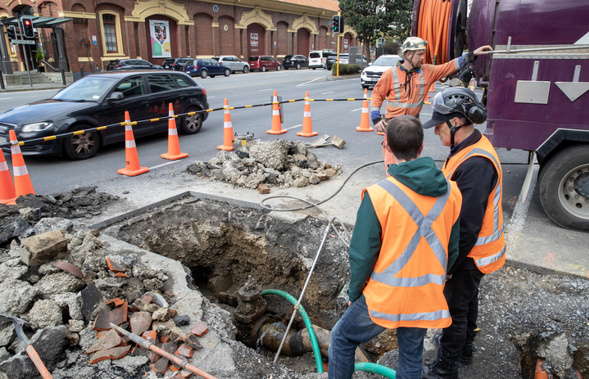
The CEO of Water New Zealand has mapped out the dire picture of the country's water infrastructure shortcomings, explaining that only 26km of a necessary 100km of piping is being renewed annually.
One of the country's ongoing themes last year was the issues surrounding Wellington's water use after executives revealed that upwards of 40 per cent of the city's water was being lost through leaks.
Recently, Local Government Minister Simeon Brown wrote to both city and regional councils in the Wellington district demanding answers for what steps were being taken to fix the mess. It's expected Brown will receive responses from all parties on Thursday.
Water NZ is an industry association that remains politically neutral and focuses on ensuring the country's water infrastructure remains up to scratch and meets public demand. It is comprised of members from councils, engineers, consultants and equipment suppliers.
The association's CEO, Gillian Blythe, told The Mike Hosking Breakfast this morning that the current figures around leakages in Wellington were cause for concern.
"It's not good. You've got to remember, it's not just that you've had to spend money to treat the water before it leaves the treatment plant, but then it's putting stresses throughout the system," she said.
"Because then you're going to have to find more water and sources of water so you can have the water you need at home and for business."
Hosking asked Blythe what the extent of the country's water leakage problems was, Blythe explained that there was a pressing need for New Zealand to invest more heavily to fix its water woes.
She said the problems weren't the result of only a year or two of neglect, but an infrastructure deficit across the country that has been several years in the making and is expected to take decades to resolve.
"To give you an indication, and this is as true as much in Auckland as in Wellington, we're currently renewing about 26km of pipes in the capital, every year. We need to renew about 100km of pipes," she explained.

"And when I had the conversations with Watercare [which is responsible for Auckland's water infrastructure], it's the same sort of magnitude. So that's the level of deficit we're facing and we need to start it [the repairs] now."
Blythe was then asked what the extent of change would be to the problem within a year of work from Water NZ and government agencies stepping in to support. She responded first with an acknowledgement there was a much better understanding of the problem.
She said many New Zealand residents had spoken up about their frustration over wanting to go to the beach over the summer but were unable to swim after major rainstorm events causing sewage problems - meaning people considered the response to the issues "not good enough".
However, Blythe said, pressure from politicians needed to be applied as part of the solution.
"What we need to get to is where we have an agreement across local and central government on what is the way forward," she told Hosking.
"That's the only way we're going to see investment in water infrastructure, which will then give us the well-defined, committed, funded pipeline at work because we're going to have to train people because you can't go from 26km of pipe renewals a year to 100km without a few more people."
A couple of weeks ago, Wellington Water defended its approach to tackling water leaks across the city and explained the work it is doing often isn't visible to the public eye.
The head of regulatory services for Wellington Water, Charles Barker, was asked why the agency appeared slack on fixing the leakages, to which he said he empathised with the frustration that people felt passing leaks each day.
However, Barker said, the work being done was more than met the eye.
"The assurance I can give to those people is that with the resources Wellington Water has, we are going after the big leaks and sometimes those aren't seen," he said.
"The reason we're going after big leaks and the ones you can't see all the time is that we need to get the volume of leakage down. If we get the volume down, it's our best chance of keeping the region at low levels of restriction in the shortest amount of time."
Barker said his team was working on several leaks, but there was no single leak that was considered the biggest issue at present.
"What [our team does] is work through a prioritisation programme and they figure out a system for what they're doing, then they methodically work through the highest volume leaks."
Take your Radio, Podcasts and Music with you









